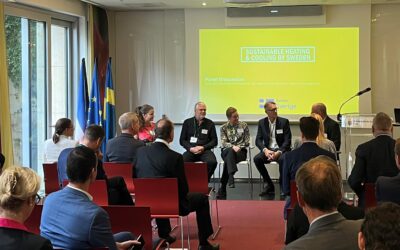The Lahn Becomes a Heat Supplier: Gießen Invests in River Heat Pumps • Hamburg Turns Industrial Waste Heat into Climate-Neutral District Heating • Cologne to Build Europe’s Largest River Water Heat Pump • Read more about the developments in sustainable heating and cooling in this month's news update from Germany
Germany’s energy transition is taking a bold step forward in the city of Gießen, where the municipal utility Stadtwerke Gießen (SWG) is building the region’s largest and most innovative heating project. The €30 million “Power-Lahn” energy center will use giant heat pumps to extract thermal energy from the river Lahn, providing climate-neutral heating and hot water for 3,900 households. Scheduled to go into operation in summer 2026, the project is the first of its kind in the state of Hesse and represents a pioneering model for sustainable urban energy supply.
At the heart of the project are three river-water heat pumps, each weighing 22 tons, capable of generating 29 million kilowatt hours of heat annually while saving 7,700 tons of CO₂. By cooling the Lahn by only 0.2 degrees, the system will have minimal ecological impact while delivering maximum efficiency. Complemented by a rooftop solar installation, two combined heat and power plants, and a “power-to-heat” unit, the Power-Lahn complex integrates multiple renewable and flexible generation technologies. Together, they will cut carbon emissions by around 10,000 tons per year and reduce dependence on fossil fuels – an increasingly strategic concern in today’s geopolitical climate.
For Swedish companies eyeing opportunities in Germany’s energy and heating transition, Power-Lahn is a strong signal: municipalities are ready to invest in large-scale, climate-friendly solutions that combine cutting-edge technology with public visibility and support. As Mayor Frank-Tilo Becher puts it, “This is where the future of our city is being built.”
Read more in article from Giessner Allgemeine
Hamburg is showcasing how industrial by-products can power the energy transition. In a pioneering €20 million project, the copper producer Aurubis and energy supplier Enercity Contracting are capturing waste heat from copper refining and feeding it directly into the city’s district heating system. The initiative supplies clean, CO₂-free heat to HafenCity East, a growing residential district, turning what was once wasted energy into a reliable urban heating source.
The system uses heat released when sulphur in copper concentrates reacts with oxygen to form sulphuric acid – a process that generates significant thermal energy. Previously, this heat was simply cooled with river water and discharged unused. Today, a specially retrofitted plant with heat exchangers, pumps, and a 3.7-kilometre pipeline channels the energy into Hamburg’s heating network. An additional energy station ensures storage and backup, guaranteeing security of supply even when copper production pauses.
For Swedish companies, the Hamburg project highlights the strong demand for technology and expertise in industrial waste heat recovery. While the copper smelter’s location makes the setup unique, the concept is replicable across Europe’s industrial clusters. Incentives for CO₂-free heat and green markets could accelerate adoption. As Hamburg demonstrates, transforming waste into climate-neutral heating is not just a technical achievement – it is a business opportunity that will shape the future of sustainable cities.
Read more in article from Euronews
Cologne is taking a major step in its energy transition with the construction of Europe’s largest river water heat pump. Local utility RheinEnergie, in partnership with Augsburg-based MAN Energy Solutions, is investing €280 million in a plant that will draw heat from the Rhine and feed it into the city’s district heating network. Backed by €100 million in funding from the German government and the EU, the system will supply climate-friendly heating to around 50,000 households once operational in winter 2027/28.
The facility, located in Cologne’s Niehl district, will consist of three 50-megawatt modules and a water intake system capable of extracting 25,000 cubic meters of Rhine water per hour. Through a closed-loop process, the heat pump will raise water temperatures up to 110°C, providing reliable and efficient energy. Its location at Niehl harbor offers another advantage: direct access to existing grid infrastructure and RheinEnergie’s gas-fired power plant, ensuring operational flexibility.
For Swedish companies, Cologne’s project underscores the scale of opportunity in Germany’s decarbonization of district heating. Large-scale heat pumps are gaining momentum across Europe, with recent installations in Denmark, Flensburg, and Hamburg. As RheinEnergie CEO Andreas Feicht noted, tapping rivers for energy is “exemplary for unlocking the dormant potential of Germany’s major waterways.” With demand for advanced technology, engineering expertise, and international collaboration growing, Sweden’s cleantech sector is well-positioned to contribute to similar transformative projects.
Read more in article from Heise
To stay updated on news for sustainable heating and cooling, follow us on LinkedIn, and subscribe to our Newsletter.
Sweden is at the forefront of decentralised heat networks technology. Our aim for “Sustainable Heating & Cooling by Sweden” is to facilitate knowledge sharing between British, French and Swedish stakeholders and develop and encourage environmental and economic best practice.
To find out how we can help you and your organisation, please contact our London or Paris-based “SHC” teams. We can introduce you to leading consultants, suppliers of technology and services who will be pleased to share know-how of the development of sustainable heating & cooling solutions.


